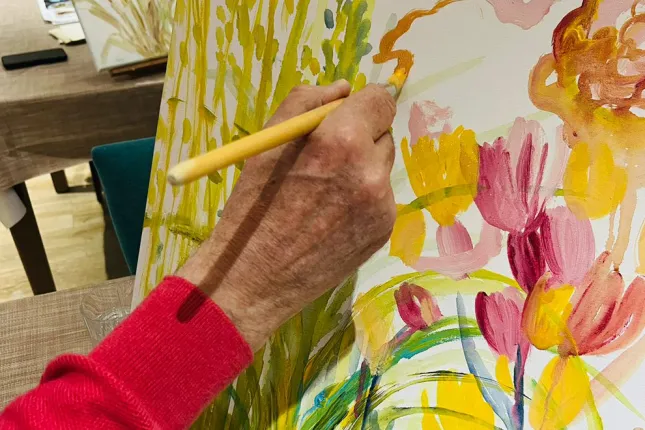Nurturing Connections and Enhancing Quality of Life
Dementia is a complex neurological condition which is characterised by a constellation of different symptoms including a decline in cognitive abilities, memory loss and behavioural changes.
As the condition progresses, individuals living with dementia may experience challenges in communication such as expressing themselves and comprehending verbal and non-verbal information.
Maintaining meaningful connections and effective communication with loved ones and caregivers remains crucial for their emotional wellbeing and overall quality of life, something we are really passionate about instilling at Loveday.
Understanding the Communication Challenges in Dementia
As dementia affects various cognitive functions, individuals may encounter difficulties in several aspects of communication. These challenges include:
Dementia can impair an individual’s ability to find the right words, leading to hesitations, pauses and a decline in overall vocabulary. Expressing thoughts and feelings becomes increasingly challenging, leading to frustration and withdrawal.
People living with dementia may struggle to understand complex instructions or follow conversations. They might miss or misinterpret cues which can to confusion and misunderstandings. Additionally, complicated concepts and metaphors may become difficult to grasp.
Memory loss is a hallmark symptom of dementia and one of the very first signs of the disease. Individuals may have trouble recalling recent events, dates, and directions, they may struggle to recognise familiar faces or recall names of people, including their own family. This can hugely affect confidence and impact their ability to engage in conversations and connect with people.
Dementia can disrupt an individual’s ability to interpret non-verbal information such as facial expressions, body language and tone of voice. They may find it challenging to gauge emotions and intentions which may lead to miscommunication and cause stress.
Strategies for Effective Communication
Despite the various communication challenges caused by dementia, there are several strategies that can be implemented to enhance interactions and maintain meaningful connections:
Demonstrating patience and empathy is important when communicating with individuals living with dementia. Taking the time to listen attentively, maintaining eye contact and showing genuine understanding can help foster trust and create a supportive environment.
Using simple and concise language, avoid jargon and take time to break down complex information into smaller, more manageable chunks to help aid comprehension. Additionally, providing visual cues or gestures can supplement verbal communication and facilitate understanding.
Using non-verbal cues such as facial expressions, a reassuring touch and body language can compensate for verbal difficulties. A warm smile and a calm tone of voice can convey emotions and create a sense of security.
Being fully present, paying attention and responding appropriately is key. Encouraging individuals to express themselves, asking open-ended questions and validating their emotions can promote engagement and feelings of self-worth.
Creating a familiar, safe and predictable environment can provide individuals living with dementia a sense of comfort and security. Establishing routines for activities like meals, outings and personal care can reduce anxiety and aid communication.
Providing a range of multi-sensory activities such as music, art or reminiscence can stimulate the senses, evoke memories and facilitate communication. Continuing the pursuit of hobbies and interests and adapting these accordingly is hugely beneficial.
As dementia progresses, communication abilities may decline further. Caregivers and loved ones should remain flexible and adapt their communication strategies accordingly, modifying their approach to suit the individual’s changing needs.
Communication is Key to Quality of Life
Effective communication is fundamental to maintaining a person’s sense of identity, dignity, and wellbeing, even in the face of dementia. Meaningful connections and positive interactions can alleviate feelings of loneliness, frustration and isolation, promoting a better quality of life for individuals living with dementia.
Caregivers, family members and healthcare professionals play a pivotal role in fostering communication and supporting individuals living with dementia. By understanding the challenges, employing appropriate strategies and creating a nurturing environment, they can help individuals maintain their dignity, express their needs and feel valued and connected despite the difficulties posed by dementia.
Dementia presents significant challenges to communication which can affect all aspects of daily life and communication including language, comprehension, memory and non-verbal cues. Despite the challenges, meaningful communication can be achieved through patience, empathy and the use of tailored strategies. By fostering connections and promoting effective communication with people living with dementia, we can enhance emotional well-being and overall quality of life, providing the support and understanding they need at every step of the way.





